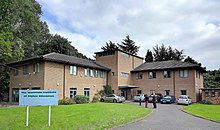The Markfield Institute of Higher Education is an educational institution based in Leicestershire, in the United Kingdom.[1] Specialising in Islamic subjects, the institute runs part-time and full-time courses, awarding BA and MA degrees validated by Newman University, and PhD degrees validated by the University of Gloucestershire.[2][3] The institute is accredited by the British Accreditation Council, reviewed by the Quality Assurance Agency for Higher Education, and registered with the Higher Education Funding Council for England.[1]
 | |
| Established | 2000 |
|---|---|
| Principal | Zahid Parvez |
| Location | , 52°40′35″N 1°16′18″W / 52.6765°N 1.2716°W |
| Website | https://www.mihe.ac.uk/ |

Currently, the fees are £4,500 a year for UK and EU students, and £7,500 a year for international students.[4][5]
The institute was established in 2000 and inaugurated by the Prince of Wales.[6] In 2015, the institute was shortlisted for The Muslim News Award for Excellence in Education.[7]
History and ethos
editThe Markfield Institute was established in the 2000, and was inaugurated by Prince Charles. The institute aims at promoting understanding between Muslim communities in the West and the pluralistic societies they are a part of through the positive contributions of its graduates.[6] The institute endeavours to “integrate the richness and high standards of traditional Islamic scholarship with the best of Western research techniques, academic rigour and critical inquiry.”[1] Over the years, more than 750 students have graduated from the Institute.[1]
Location
editThe Markfield Institute is located within the rural village of Markfield in the British Midlands and is easily accessible by car and public transport.[8] The village is situated within both National Forest and Charnwood Forest. It lies very close to the M1 motorway roughly 8 miles north west of Leicester, and 10 miles south east of Loughborough. The institute is roughly 100 miles from London.
Notable attractions near the Institute include the Thornton Reservoir and Bradgate Park.[8]
Academic programmes
editThe institute currently offers the following accredited BA and MA degrees:[1]
- BA Islamic studies [9]
- MA Islamic studies [10]
- MA Muslim chaplaincy [11]
- MA Islamic banking, finance and management [12]
- MEd Islamic education [13]
- MA Islam and sustainable development [14]
New PhD applications are currently not being taken.[3]
Scholars
editPast academic staff
editOver the years, many scholars have served as part of the academic teaching staff at the Institute. They include:
- Ataullah Siddiqui (reader in religious pluralism and inter-faith relations)[15]
- Fozia Bora (University of Leeds)[16]
- Dilwar Hussain[17]
- Abdullah Sahin (University of Warwick)[18]
- Adil Salahi[19]
Outside academics
editThe Markfield Institute regularly invites outside scholars to present their research in lectures that are open to the public. Various scholars have given lectures over the years. These include:
- Mohammad Akram Nadwi (Al-Salam Institute)[20]
- Andrew Neil
Two-year BAs for darul uloom graduates
editWith Accreditation of Prior Learning (APL), the Markfield Institute allows students with prior training in Islamic studies, such as graduates of darul ulooms, to start their undergraduate degrees from the second year, thus allowing such students to complete a BA in two years.[21]
Facilities
editThe Markfield Institute Library
editThe institute houses one of the largest Islamic libraries in Europe, holding over 40,000 volumes of books and journals.[1]
Students of the institute may also use libraries of the University of Leicester and De Montfort University for reference purposes.[22]
On site accommodation
editSelf-catering accommodation is available on site. Separate buildings serve has accommodation blocks for male and female students.[22]
The Markfield Mosque
editThe Markfield Mosque is located on the institute’s campus. Friday sermons are given by both students and scholars.[22]
Past sermons have been given by notable scholars like Abdal Hakim Murad of the Cambridge Muslim College.[23]
Sports facilities and gym
editThe campus also has sports facilities that may be used to play football, volleyball, badminton, pool and table tennis. A small gym is also available.[22]
References
edit- ^ a b c d e f "About us | MIHE". The Markfield Institute. Retrieved 27 May 2016.
- ^ "Prospective Students | MIHE". The Markfield Institute. Archived from the original on 28 June 2016. Retrieved 3 June 2016.
- ^ a b "Research Degrees | MIHE". www.mihe.ac.uk. Retrieved 15 April 2017.
- ^ "BA in Islamic Studies | MIHE". www.mihe.ac.uk. Retrieved 15 April 2017.
- ^ "MA in Islamic Studies | MIHE". www.mihe.ac.uk. Retrieved 15 April 2017.
- ^ a b MarkfieldInstitute (29 January 2009), Introduction to MIHE, retrieved 29 April 2017
- ^ "The Muslim News Awards for Excellence 2015 Short-list - The Muslim News". The Muslim News. Retrieved 15 April 2017.
- ^ a b "Student Information | Markfield Institute of Higher Education". www.mihe.ac.uk. Retrieved 29 April 2017.
- ^ BA Islamic Studies
- ^ MA Islamic Studies
- ^ MA Muslim Chaplaincy
- ^ MA Islamic Banking, Finance and Management
- ^ MEd Islamic Education
- ^ MA Islam and Sustainable Development
- ^ "Dr Ataullah Siddiqui | MIHE". www.mihe.ac.uk. Archived from the original on 16 April 2017. Retrieved 15 April 2017.
- ^ Leeds, University of. "Profile - Faculty of Arts - University of Leeds - Fozia Bora". www.leeds.ac.uk. Retrieved 15 April 2017.
- ^ "Dilwar Hussain | Maslaha". www.maslaha.org. Retrieved 16 April 2017.
- ^ "Dr Abdullah Sahin". www2.warwick.ac.uk. Retrieved 15 April 2017.
- ^ "Kube Publishing » Adil Salahi". www.kubepublishing.com. Retrieved 29 April 2017.
- ^ "Shaykh Dr Mohammad Akram Nadwi Addresses Students on Open Day | Markfield Institute of Higher Education". www.mihe.ac.uk. Retrieved 2 May 2017.
- ^ "BA Courses | MIHE". The Markfield Institute. Retrieved 3 June 2016.
- ^ a b c d "Facilities | Markfield Institute of Higher Education". www.mihe.ac.uk. Retrieved 29 April 2017.
- ^ Islamic Foundation UK (9 September 2016), The Transformative Hajj of Sayyiduna Ibrahim: Khutba by Shaykh Abdal Hakim Murad (09/09/2016), retrieved 29 April 2017